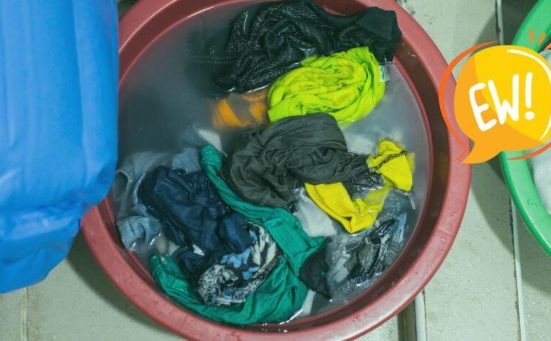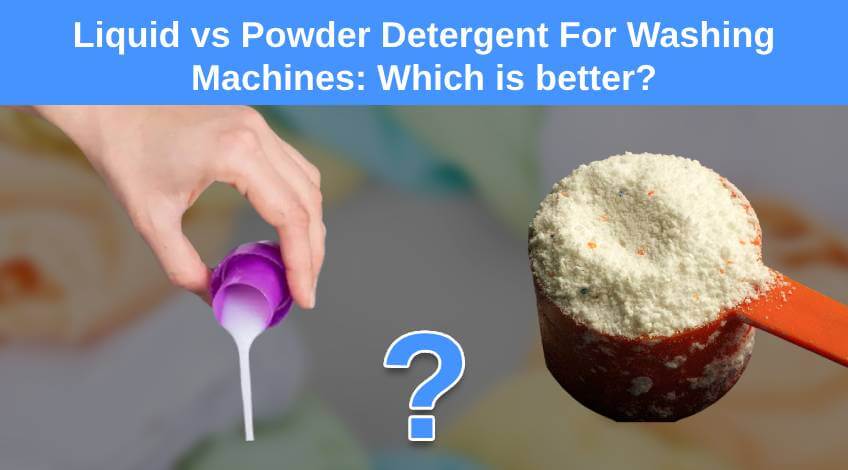
Liquid vs Powder Detergent For Washing Machines: Which is better?
Are you often torn between liquid and powder detergent when doing your laundry? If you’ve ever wondered which one is the superior choice for your washing machine, you’re in the right place.
When it comes to washing your clothes, choosing the right detergent can make a significant difference in the cleanliness and lifespan of your garments.
This article is here to guide you through the ins and outs of these two detergent options. Let’s have a closer look to find out which is better: liquid or powder detergent, as each has its own set of advantages and disadvantages.
Which One Should You Use: Liquid or Powder Detergent?
Liquid Detergent: Versatile And Easy to Handle
Many would argue that liquid detergent is the way to go. It’s versatile, easy to handle, and has become increasingly popular. But is it truly the better choice? Well, that depends on several factors, including your personal preferences and laundry needs.
Powder Detergent: A Time-Tested Classic
Powder detergents have been the primary choice in many households for years. They are known for their reliability and cost-effectiveness. However, the ongoing debate revolves around whether they outshine their liquid counterparts.
Now, let’s look into the pros and cons of using liquid and powder detergents in your washing machine.
The Pros And Cons Of Using Liquid Detergent In Your Washing Machine
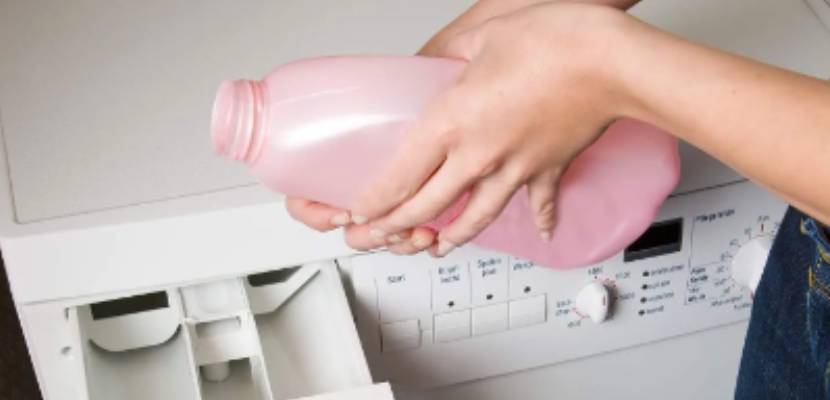
The Advantages Of Using Liquid Detergent
Effectively Removes Grease And Oil Residue
Liquid detergents contain powerful chemicals that excel at tackling grease and oil residue. So, if you’re frequently in the kitchen or working with vehicles, liquid-based detergent is your best ally.
Can Be A Stain Pre-treatment
Liquid detergent can double as a stain pre-treatment. Simply apply a small amount to the stain and let it sit for a while before washing. You’ll be amazed at how much easier it is to remove the stain afterwards.
Easy To Put In The Detergent Compartment
Liquid detergent is incredibly user-friendly. Most brands provide a handy cap for precise measurements, making it easier to pour directly into your machine’s detergent compartment.
Dissolves In Water Easily
Liquid detergent dissolves rapidly, leaving no residue. This feature makes it ideal for cold washes with lower temperatures, and it’s a time-saver for handwashing your clothes, leaving them smelling fresh and clean.
Great For People With Sensitive Skin
Liquid detergents, because they dissolve so thoroughly, are less likely to cause skin irritations, making them a top choice for individuals with sensitive skin conditions like eczema.
Easy To Store
Liquid detergents usually come in compact plastic bottles, which are easy to store and take up minimal space in your laundry area.
Best For Coloured Clothes
If you want to preserve the vibrancy of your coloured garments, liquid detergent is the way to go. Its gentle formula helps protect the dye in your clothing, keeping colours looking vivid and fresh.
The Disadvantages Of Using Liquid Detergent
Can Be Difficult To Portion
The ease of pouring liquid detergent can be a double-edged sword. It’s simple to accidentally pour more than necessary into the detergent compartment, leading to overly soapy laundry and potential rinse cycle problems.
Usually More Expensive
Liquid detergents typically come with a higher price tag compared to their powder counterparts. If you currently have a tight budget, liquid detergent might not be the most budget-friendly choice.
Packaging May Not Be Recyclable
Most liquid detergents are packaged in plastic bottles, which are not the most eco-friendly option. However, some brands offer bottles that can be recycled, so it’s essential to check the packaging if you’re environmentally conscious.
The Pros And Cons Of Using Powder Detergent In Your Washing Machine
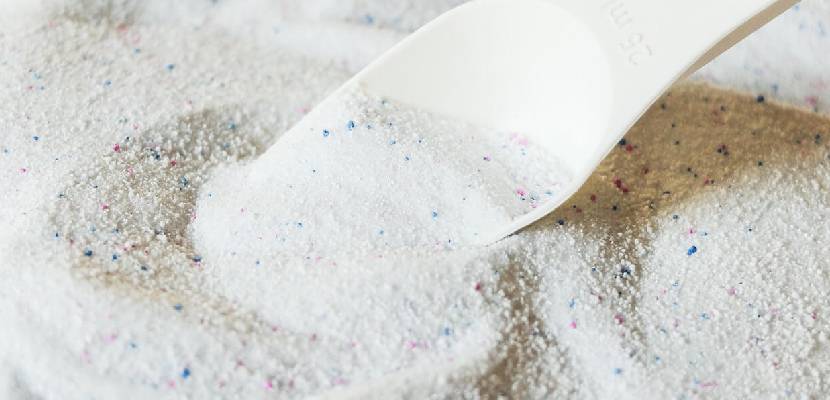
The Advantages Of Using Powder Detergent
Cheaper To Buy
The primary advantage of powder detergents is their affordability. They cost less than liquid detergents, making them an attractive option for those looking to save on laundry expenses.
Effectively Removes Many Types Of Stains
Powder detergents are highly effective at removing a wide range of stains, from blood and grass to mud and more. If you’re frequently outdoors and encounter tough stains, powder detergents are a must-have in your laundry room.
More Eco-friendly Packaging
Powder detergents often come in recyclable cardboard boxes. This makes them a more environmentally friendly choice compared to the plastic packaging of liquid detergents. You can easily recycle or dispose of these boxes properly.
Great For White Clothes
Most powder detergents contain brightening agents or bleach, which helps keep your white clothing looking its best. They’re a fantastic option for maintaining the brightness of your whites.
No Spilling
One of the hassles of using liquid detergent is the potential for spills. Powder detergent is much less messy and is easy to measure out accurately using a scooper.
The Disadvantages Of Using Powder Detergent
Does Not Dissolve Easily
Powder detergent has a tendency to clump and takes longer to dissolve in water. This can result in residue clinging to your clothes, leading to an unpleasant odour. To avoid this, you may need to run an extra rinse cycle, which consumes more energy and water.
Leaves Residue In The Washer
Powder detergents also leave residue in your washing machine’s components, potentially causing blockages and other issues. This can lead to mould growth and drainage problems, eventually needing expensive repairs.
Not The Best For Cold Washes
Because powder detergents clump and take time to dissolve, they may not perform well in cold washes that use low-temperature water. This can result in your garments not getting thoroughly cleaned, especially when using gentle or delicate cycles in your washing machine.
May Irritate Your Skin
Powder detergents can irritate sensitive skin conditions due to the residue they leave on clothing fibres. If you have delicate skin, liquid detergents are the safer and gentler option.
Liquid Or Powder Detergent? Which One Do You Need?
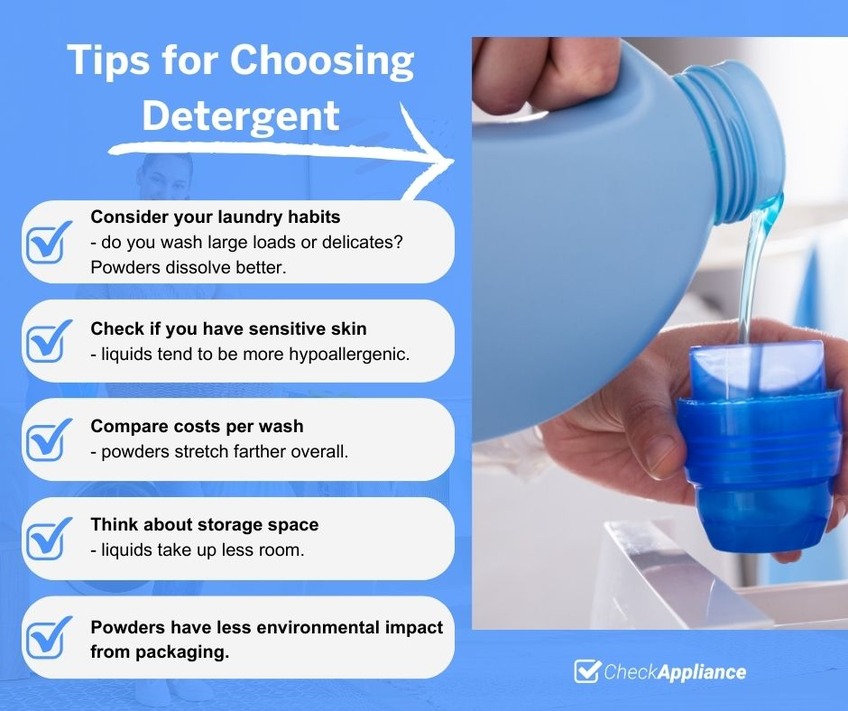
Whether you should go for liquid or powder detergent for your washing machine depends on your unique circumstances and priorities.
Liquid detergents excel in their stain-fighting capabilities, ease of use, and compatibility with sensitive skin. On the other hand, powder detergents are cost-effective, efficient at stain removal, and environmentally friendly.
So, which is better for you? It’s a personal choice. Consider your laundry habits, skin sensitivity, and environmental concerns when making your decision. Ultimately, both liquid and powder detergents can get your clothes clean and fresh, so feel free to choose the one that suits your lifestyle and laundry preferences!
Do you have laundry tips to share? Feel free to comment below!
SEE ALSO: How Long Do Washing Machines Take To Wash Clothes?
Frequently Asked Questions
Liquid detergent is in some ways better than powder in hard water because it tends to dissolve more effectively in such water conditions, reducing the likelihood of soap scum buildup on clothing and in the washing machine.
The benefit of liquid laundry detergent is its versatility and ease of use. It can be a stain pre-treatment, dissolves easily, and is gentle on sensitive skin.
Most washing machines can use liquid detergent without any issues. However, it’s essential to follow your washing machine’s manufacturer recommendations to ensure compatibility.
Powder laundry detergent can potentially clog pipes if it doesn’t dissolve completely in the wash cycle. This can lead to plumbing issues over time.
If you use too much detergent, it can lead to excessive soap residue on clothes, potential rinsing problems, and, in the case of powder detergent, it may require extra water and energy to rinse out.
Also, follow us on Pinterest ...

